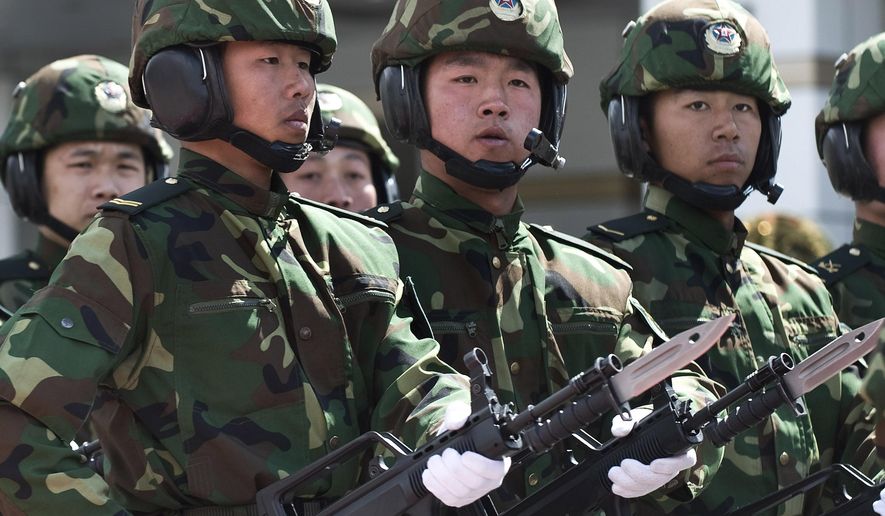Dubbed “Peace Mission 2014,” the “antiterrorism” military exercise hosted by the Shanghai Cooperation Organization (SCO) took place last month in northern China amid growing tensions within the regional alliance.
Five nations — China, Russia, Kazakhstan, Kyrgyzstan and Tajikistan — sent a total of 7,000 soldiers to the six-day maneuvers that ended Aug. 29, including 5,000 People’s Liberation Army (PLA) troops and 1,000 Russian soldiers.
The Chinese were particularly gung-ho, treating the exercise as an opportunity to show off new military muscle and hardware, including two dozen of its most presentable aircraft, like the J-10 and J-11 fighter jets, JH-7 fighter bombers and the airborne early warning and control aircraft KJ-2000. Also debuting in the SCO exercises were the PLA’s WZ-9 and WZ-10 attack helicopters, the Type 99 Main Battle Tanks and the CH-4 unmanned combat aerial vehicle.
The main targets of the drills’ scenarios are what China calls “the Three Evil Elements” — violent terrorists, ethnic separatists and religious extremists — code words mainly reserved for Tibetan and Uighur activists and protesters, many of whom have been subjected to decades of crackdowns.
But the exercises occurred amid growing tensions within the SCO, notably involving Moscow and Beijing quietly contesting for leadership of the regional security pact.
Noticeably missing from the Chinese-hosted drill was SCO’s sixth member, Uzbekistan, which boycotted the event on account of its growing unease over the presence of Tajikistan. The two countries are engaged in border disputes.
Russia commands overwhelming influence within the SCO, but its grip over members from the Central Asian former Soviet republics is slipping, giving China a chance to act as the presumptive SCO leader.
Last month China voiced unhappiness about losing a Tank Biathlon competition to Russia, and was humiliated by the mechanical breakdown of the PLA’s Type 96A main battle tank in front of the Russian reviewing stand. This time China sent its best tank — the Type 99 — for the show in front of the Russians.
Russian President Vladimir Putin is clearly aware of the Chinese competition for prominence within the SCO and is trying to hold onto its influence over other Central Asian members, especially Kazakhstan, which is just as strategically important to Mr. Putin as Ukraine and Belarus.
In late May Mr. Putin put together a Moscow-led Eurasian Economic Union that includes Russia, Kazakhstan and Belarus, which will launch Jan. 1. Designed to counter the European Union, the EEU encompasses one-eighth of the world’s land mass. Armenia, Tajikistan and Kyrgyzstan are expected to join soon.
Part of China’s strategy to undermine Russian influence in Central Asia is to cultivate bilateral economic and strategic relations with some of Russia’s key allies, especially Kazakhstan, which was the last to declare independence from the Soviet Union and has been one of the strongest allies of Moscow ever since.
But China is eroding Russia’s influence over Kazakhstan. The largest foreign acquisition by a Chinese company was the state-owned China National Petroleum Corp.’s $4.2 billion takeover of Kazakhstan’s largest oil company, PetroKazakhstan, in 2005.
In 2009 China gave Astana $10 billion to gain a stake in the huge natural gas project MangistauguMunaiGas. Unlike its belligerent behavior toward several other neighbors, China has been most compromising, civil and cooperative in resolving border disputes with Kazakhstan — all with the strategic calculation to win it over from Russia.
Mr. Putin is not helping himself either. The strong bond between Russia and Kazakhstan was in jeopardy even while the SCO drills were going on in China — it’s entirely of Mr. Putin’s own doing, much to the delight of Beijing.
On Aug. 29 Mr. Putin made a public comment about Kazakhstan and its strongman, Nursultan Nazarbayev, who has ruled the country since 1989.
“Kazakhstan never had any statehood,” Mr. Putin said. “[Nursultan Nazarbayev] created a state on a territory that never had a state.”
That statement sent a chill throughout Kazakhstan in light of what the Russian leader has done in Ukraine. It was interpreted as a Moscow attempt to deny Kazakhstan’s independence after the 74-year-old Mr. Nazarbayev leaves office soon.
Mr. Nazarbayev was furious over Mr. Putin’s remarks and responded immediately.
“Kazakhstan has a right to withdraw from the Eurasian Economic Union,” he threatened on Kazak television. “Kazakhstan will not be part of an organization that poses a threat to our independence.”
“Our independence is our dearest treasure, which our grandfathers fought for,” he continued. “First of all, we will never surrender it to someone, and secondly, we will do our best to protect it.”
Chinese state-run media took great delight in running the Putin-Nazarbayev feud while the SCO drills were going on.
“Strong response from Kazak president believed to counter Putin: Kazakhstan has 1,500 years history,” read the headline in the Beijing-based Global Times.
• Miles Yu’s column appears Fridays. He can be reached at mmilesyu@gmail.com and on Twitter @Yu_Miles.
• Miles Yu can be reached at yu123@washingtontimes.com.




Please read our comment policy before commenting.